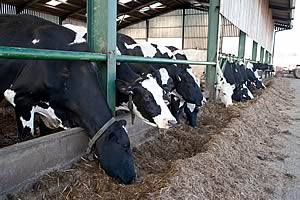 |
|||||||||
|
|||||||||||||||||||
|
|
UK, USA and Canada in Major Dairy Breeding Collaboration A ground-breaking agreement has been reached between the UK, USA and Canada which will shape the future of dairy cattle breeding in these three countries. Through a three-way collaboration, genomic information for many thousands of bulls will be shared, which will benefit the farming and cattle breeding industries in each participating country.
In UK terms, this means that from later this year, breeding indexes for most Holstein bulls will include information obtained direct from their own DNA. This represents a major step forward for farmers using young bulls in particular, who previously only had access to young sire breeding information which had been estimated from parent and ancestor performance. It will also pave the way for females to be accurately genomically tested, presenting greater opportunities in due course. For the USA and Canada, both of whom already publish genomic evaluations, the benefit will come through further improvements in their accuracy and reliability. The overall effect will be that the three countries will collectively calculate the most reliable genomic evaluations that they have been able to produce to date. “Genomic evaluations represent an advancement for cattle breeders, and this collaboration means that when they become available in the UK later this year they will be more accurate and reliable than we would have ever been able to achieve on our own,” says Marco Winters, head of genetics at DairyCo, the British player in the collaboration. “Two key factors will contribute to this reliability, one being the high numbers of bulls whose genotypes will be measured across the three countries; the other being UK investment in the ‘high density’ technology which has been adopted to genotype a new tranche of around 2,500 bulls being used in the UK and North America,” he continues. “High numbers are critical to the reliability of this process, and it is this, above all, that has driven the collaboration. “But the ‘high density chip’ is also important as it measures genetic variation in far more detail than anything used routinely before, and it is timely that the UK has entered this collaboration as the high density technology has come of age,” he adds. In the UK, the background research and calculation of genomic evaluations is being undertaken at Scottish Agricultural College, who already routinely calculate the UK’s current breeding indexes for DairyCo. Other UK partners contributing are breeding companies, Cogent and Genus ABS, while a pivotal role is played by milk recording organisations National Milk Records, Cattle Information Service and United Dairy Farmers, and breed society Holstein UK. The North American partners are the USA's National Association of Animal Breeders (NAAB) on behalf of the artificial insemination organisations’ project, Cooperative Dairy DNA Repository (CDDR), and the Canadian genetic evaluation centre, Canadian Dairy Network (CDN). “The North American partners are pleased to collaborate with DairyCo to improve genomic predictions as a selection tool for the benefit of dairy producers,” said Gordon Doak, president of NAAB. The UK’s Marco Winters added: “We have learnt over recent years that collaboration is the key to producing reliable genomic indexes and I am delighted we have been able to work together both domestically and internationally to improve the reliability of North American and UK indexes.”
|
||||||||||||||||||

|
|
||||||||||||||||||
| home | agri-services | pedigree
pen | news | dairy | beef | machinery BPS | property | organisations | site map |
|||||||||||||||||||

